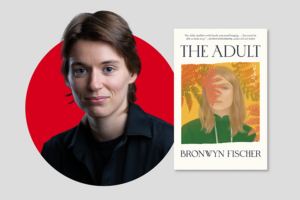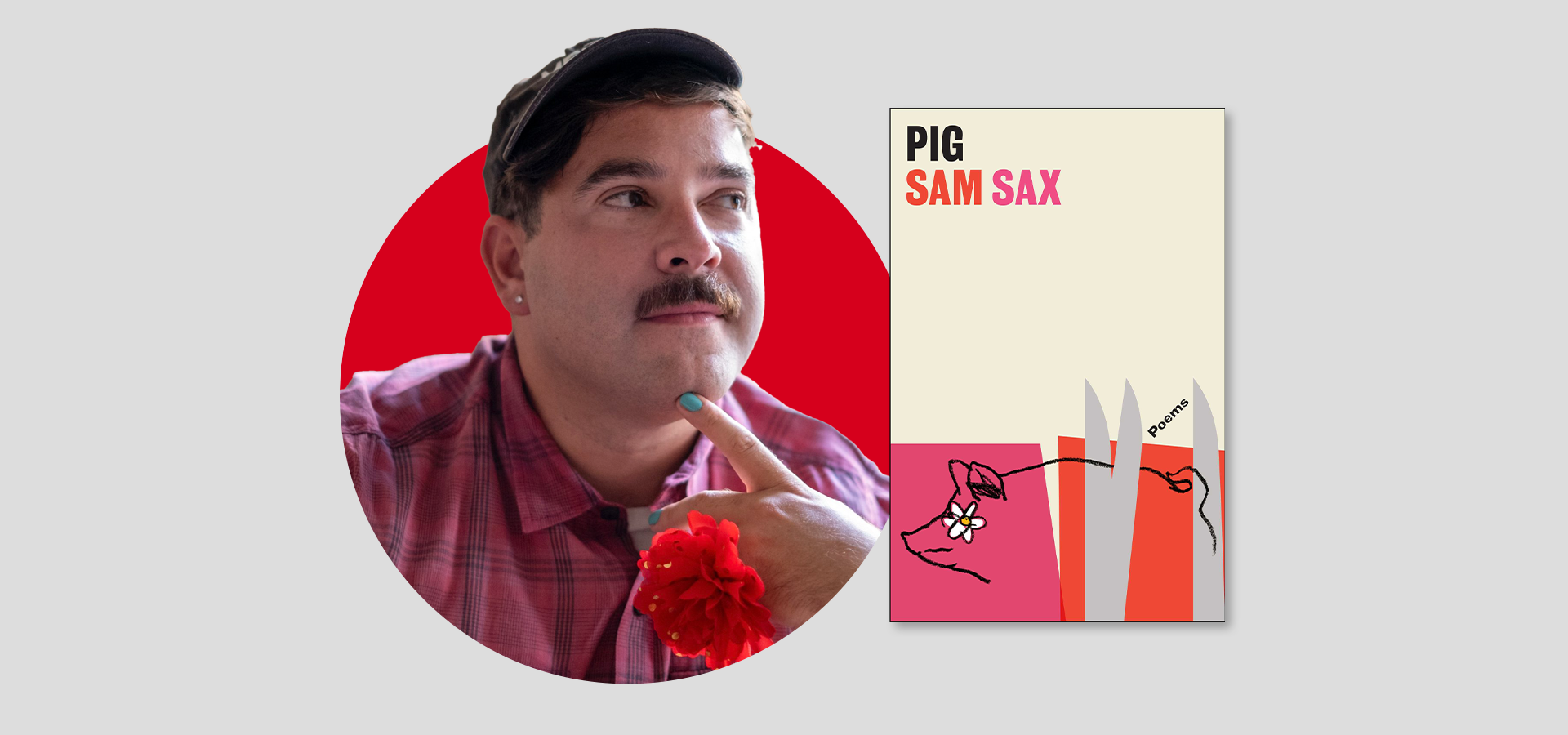
Sam Sax | The PEN Ten Interview
September 19, 2023
In Sam Sax’s new poetry collection, Pig (Scribner, 2023), the pig, in its actual form and as the broadest of metaphors, serves as a lens through which to explore the body, faith, desire, and power. Funny, smart, angry, questioning – Pig interrogates the self and the world.
In conversation with World Voices Festival Intern Katie Dorfman for this week’s PEN Ten, Sam Sax speaks about all things pigs, their poetic inspirations, and their writing practice. (Barnes & Noble, Bookshop)
1. Your acknowledgements section mentions people sent you pig art, artifacts, and articles while writing this book. What was your favorite pig gift, and did it inspire a specific work?
When you work on a project for long enough (and annoy those around you talking about it for long enough) people start to send you materials relating to your research. In the six years I’ve worked on this book, so many delightfully odd lovelinesses and terror objects have come my way. One joy is a sequined sparkly pig purse from my partner’s mom Janice, which I’ll hopefully be taking with me to readings. I’ve also received a fair share of pig art, a pig lighter, pig earrings, pig garments, and plenty of pig figurines and stuffed pigs. So many books and articles sent my way have led to specific poems: “Erasure of the Gerasene,” “Demoniac,” “Lex Talionis,” “Nearly Every Invading Army,” and a ton of poems that didn’t make it into the book all came from articles, headlines, or books people sent me. Having completed the book now, there’s a kind of sadness I’ve been feeling as folks keep sending me these portals into new possible poems, since I’m trying to write less about pigs now. My partner wants me to write a chapbook/b-sides book of pig poems–a pig appendix, they call it–which, who knows, but that seems unlikely. Also, while a clever title, I learned recently pigs don’t have appendices.
2. What was the catalyst for the pig as the book’s focus? Why a pig?
Since finishing my last book (bury it), I’d been writing individual poems all orbiting a handful of subjects (transgression, queerness, faith/Judaism, constructions of gender/masculinity, state violence/surveillance, etc.) that all seemed to be falling under the umbrella of the pig. I think my dearest friend, the poet Hieu Minh Nguyen, pointed me toward this as a something my work was touching on early on and I began to think more intentionally about what using the lens of the pig to look at the history of the human might offer up—and when I did this book began to start taking form.
“I began to think more intentionally about what using the lens of the pig to look at the history of the human might offer up—and when I did this book began to start taking form.”
3. You experiment with incorporating games or fill in the blanks in some of your poems–for example, the Hangman drawing in “Lex Talionis.” What spurred this and how has experimenting with poetic forms affected what you see as the relationship between a poem’s form and its subject?
I think in that same way that every poem teaches you how to read it, every poem you make teaches you how to make it as you’re writing. For me, the practice of play and uncovering happens as I work with the language and various materials of a poem. “Lex Talionis,” for example, came from working with a book on animal trials, and I was particularly struck by a narrative around a pig trial, which I explore in the text of the poem. I worked with it across multiple forms and shapes until I found the one it takes for the book. I love the opening claim in Denise Levertov’s essay “some notes on organic form,” where she says “there is a form in all things (and in our experience) which the poet can discover and reveal.” And I’m interested in this idea of revelation, in regards to both what is revealed in the making of the poem and the claim that the search for form in writing is a revelatory process, one of spiritual and epiphanic significance.
4. In the poem “Savaging Piglets,” you tell readers to “Take out this page and eat it.” Did you mean it?
O Sure! If a reader would like and is so moved to do so. I wanted to offer an invitation to engage in a different kind of ritual or relationship with the book object. Initially this poem was a ten-page long meditation on the history of discourses around cannibalism that I’d worked on for several months and this poem was the last page of that long poem, and by the time I finally got there, I realized it was what I’d been writing toward all along.
“I think in that same way that every poem teaches you how to read it, every poem you make teaches you how to make it as you’re writing.“
5. You come from a spoken word background. How have rap and spoken word affected your poetry approach?
I think in a formal sense they’ve led me toward following sound as a mode of creating meaning in a text. In my earlyearly life of art-making, high school/college times, I was engaged in multiple kinds of art practices that worked with the performance of language—I was a theater kid, in bands, a bad rapper, and did improv, and all of those have informed my writing process, particularly the impulse to follow the sonic sensibility of a poem, as well as making and sitting with intuitive choices. I think also after years in the slam and saying poems in various odd locales (basements, pizza shops, street corners, etc.), there’s a focus on orality that’s important to me. I want the poems I make to land as powerfully when read aloud as when read on the page, albeit they’ll of course hit differently. When a poem is performed, it has a life outside how it lives on the page. I sometimes think about it as a kind of sheet music or score that guides and undergirds a performance. And this was one of the first things that pulled me into the spoken poem–how a poem necessarily has multiple lives, how each time it’s recited/cast, different fragments or images land in a listener, and it will never be performed/received in that same context or environment again.
6. How do you approach topics like Zionism in your work? Do you actively decide to write a piece addressing it, or does it occur out of work already being written?
Sometimes I’ll come to the page with a particular idea or terrain I want to explore/address, but I’d say there always has to be a moment of surprise or uncovering in the process of making the thing for the poem to feel alive. Two of the poems that are explicitly dealing with Zionism in the collection came about through very different approaches: one is “Anti-Zionist Abecedarian” (an abecedarian is a 26-line poem where each line begins with the next letter of the alphabet) and I set out to write that intentionally; the title and form came first, and I made several of those poems before landing on the one that ended up in the collection. The other poem, “Everyone’s an Expert at Something,” came about through writing about the feeling of being lost in used bookstores and following that into the surprising revelation of the poem. A door in the poem opened and a second poem arose from a place of embodied politic, outrage, and critique.
7. What advice do you have for young poets?
I don’t think I’ve got any catch-all advice, since every writer’s journey is different based on the million micro/macro factors that build out a life. But a couple things that have been lessons: I’ve learned to prioritize horizontal and community-based mentorship–these relationships grow together and have been, for me, longer lasting, more meaningful, and less extractive than traditional top-down modes of education and mentorship. I’ve also tried to view book-making as an outgrowth of a journey in a life in literature rather than its destination. And, I guess, lastly, for me poetry was one of the first things I studied of my own choosing that got more mysterious and stranger the more I studied it, and I’d say, find that thing, or many things, whatever they are, that open up and become more bewildering the more you engage with them.
8. What was one of the most surprising things you learned in writing your book?
The first thing was just how many people love and have deep and complex relationships with pigs! More often than not, whenever I told someone I was working on this book, folks would have a story from their own life or an anecdote about pigs. Occasionally folks would get mad–omg that’s my thing–and act kind of defensive that I was making a book of poems about something they held so close. In this same vein there’s this one poem (“sic transit gloria mundi”) that unpacks a conversation I had with my grandfather (rip) where he told me a new fact about our family being pig farmers, because I was telling him about this book. And I can’t help but wonder if I’d have ever learned this truth about my family if I hadn’t been working on a book of poems about pigs. I also wonder what else I might have learned if I’d shifted my focus to another object/subject. I think this is one of the gifts poems can give us, and research in particular–it’s a way of deepening your relationship to the world around you and how you live in it. By focusing on anything closely enough, often the world shows itself to you in strange and remarkable ways.
“Sometimes I’ll come to the page with a particular idea or terrain I want to explore/address, but I’d say there always has to be a moment of surprise or uncovering in the process of making the thing for the poem to feel alive.“
9. What is the most daring thing you’ve put into words? Have you ever written something you wish you could take back?
I’m having a little trouble answering the first part of this question—but to answer the latter half, there are tons of poems I’ve written and a few that I’ve published over my… gosh, fifteen years of seriously writing that I’m quite embarrassed of and don’t know if I stand by the 22-year-old self who made them, but I don’t think I’d take any of them back; they’re all part of my own uneven and odd journey of trying to be a writer.
10. Do you have any strange writing habits? What does your creative process look like?
I think the most important thing I’ve learned is to remain unfixed and open in my writing practice. Process wise a lot of poems require a different approach and method of engaging with the materials of the poem—whether it’s a practice of assemblage, collage, invention, reinvention, etc. Also, sometimes the circumstances of my life require new ways of writing; for instance, while working as a security guard, I taped sections of poems on a handheld tape recorder (pre-smartphone). Working at the front desk of a theater I scribbled notes onto my arm in Sharpie. Although, I’d say the most consistent element of my writing practice is that I like to walk around and talk aloud to myself. Usually out on the street, sometimes just around my apartment, sometimes with a voice to text thing, sometimes thumbing notes into my phone, sometimes recording some thoughts in a notebook, but the central element of this practice is following the language around while passing through a landscape and letting the landscape pass through me, and often I’ll come up with some language that either make its way into a poem or begins a line of thinking that I’ll then go ahead and follow.
Sam Sax is a queer, jewish, writer and educator. They are the author of Madness, winner of The National Poetry Series and Bury It, winner of the James Laughlin Award from the Academy of American Poets. They’re the two-time Bay Area Grand Slam Champion with poems published in The New York Times, The Atlantic, Granta and elsewhere. Sam has received fellowships from The National Endowment for the Arts, The Poetry Foundation, Yaddo, and is currently serving as a Lecturer in the ITALIC program at Stanford University. Their first novel Yr Dead will be published by McSweeney’s in 2024.
The PEN Ten Interview Series
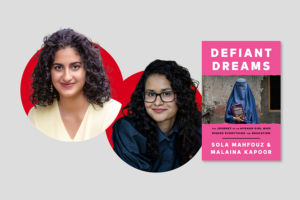
Sola Mahfouz & Malaina Kapoor | The PEN Ten Interview
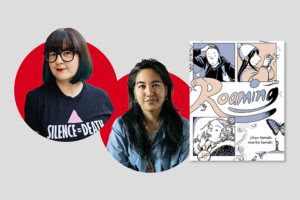
Jillian Tamaki & Mariko Tamaki | The PEN Ten Interview
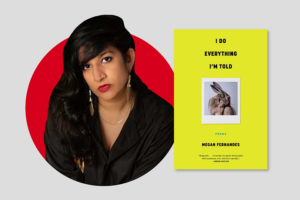
Megan Fernandes | The PEN Ten Interview
